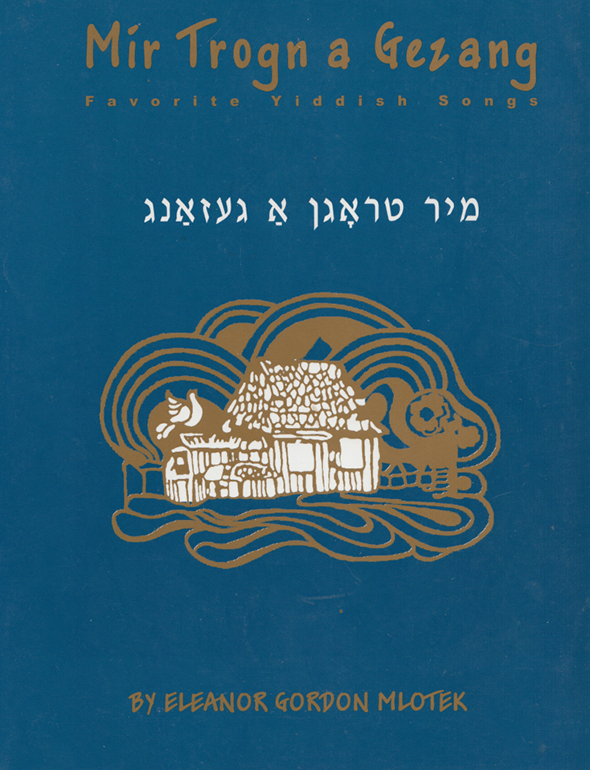This is another poem by the great Yiddish writer, Sholom Aleichem (see lkh Vil Nit Geyn In Kheyder), published in 1892. Music is by David Kovanovsky. The text was included in the first major collection of Yiddish folk songs, compiled by S. Ginzburg and P. Marek, in 1901, as an anonymous folk song, and has enjoyed enduring popularity.
It later served as a source for numerous parodies and adaptations. In a song from the period of the abortive revolution of 1905, a mother sings about a child’s father who is in Siberia. After World War I, a parody arose, criticizing the new Poland for its worthless currency and the American delegates, who sat around like lords, eating broth and chicken, while mother and child went hungry.

Sleep, my child, my comfort, my beauty,
Sleep, lull-a, lullaby.
Sleep my life, my only Kaddish,
Sleep, my little son.
Your mother is sitting by your cradle,
singing a song and weeping.
Perhaps you will understand some day
what she was thinking.
Father is in America,
Your father, my son,
Meanwhile, you are still a child,
so sleep, sleep, lullaby.
America is for everyone,
they say, great good fortune,
and a Paradise for the Jews,
something extraordinary.
There, even during the week, they eat
challah, my little son,
I will cook chicken soups for you,
So sleep, sleep, lullaby.
He will send us twenty dollars,
and his photograph, too,
and he will (may he live) take us
to him there.
Until that good voucher (ticket) comes,
sleep, my little son.
Sleep is a precious remedy,
So sleep, sleep, lullaby.
Shlof mayn kind, mayn treyst, mayn sheyner,
Shlof zhe, lyu-lyu-lyu!
Shlof mayn lebn, mayn kadish eyner,
Shlof zhe, zunenyu.
Bay dayn vigl zitst dayn mame,
Zingt a lid un veynt.
Vest a mol farshteyn mistame
Vos zi hot gemeynt.
In amerike iz der tate
Dayner zunenyu,
Du bist nokh a kind lesate,
Shlof zhe, shlof, lyu-lyu!
Dos amerike iz far yedn,
Zogt men, gor a glik,
Un far yidn a gan-eydn,
Epes an antik.
Dortn est men in der vokhn
Khale, zunenyu,
Yaykhelekh vel ikh dir kokhn,
Shlof zhe, shlof, lyu-lyu.
Er vet shikn tsvantsik doler,
Zayn portret dertsu,
Un vet nemen, lebn zol er,
Undz ahintsutsu.
Biz es kumt dos gute kvitl,
Shlof zhe, zunenyu.
Shlofn iz a tayer mitl,
Shlof zhe, shlof, lyu-lyu.
שלאָף מײַן קינד, מײַן טרײסט, מײַן שײנער,
שלאָף זשע, ליו-ליו–ליו!
שלאָף מײַן לעבן, מײַן קדיש אײנער,
שלאָף זשע, זונעניו.
בײַ דײַן װיגל זיצט דײַן מאַמע,
זינגט אַ ליד און װײנט,
װעסט א מאָל פֿאַרשטײן מסתּמא
װאָס זי האָט געמײנט.
אין אַמעריקע איז דער טאַטע
דײַנער, זונעניו,
דו ביסט נאָך אַ קינד לעת–עתּה,
שלאָף זשע, שלאָף, ליו-ליו!
דאָס אַמעריקע איז פֿאַר יעדן,
זאָגט מען, גאָר א גליק,
און פֿאַר ייִדן א גן־עדן,
עפּעס אַן אַנטיק.
דאָרטן עסט מען אין דער װאָכן
חלה, זונעניו,
יײַכעלעך װעל איך דיר קאָכן,
שלאָף זשע, שלאָף, ליו–ליו.
ער װעט שיקן צװאַנציק דאָלער,
זײַן פּאַרטרעט דערצו,
און װעט נעמען, לעבן זאָל ער,
אונדז אַהינצוצו.
ביז עס קומט דאָס גוטע קװיטל,
שלאָף זשע, זונעניו,
שלאָפֿן איז אַ טײַער מיטל,
שלאָף זשע, שלאָף, ליו–ליו.
Song Title: Shlof Mayn Kind

First published in 1972, Mir Trogn A Gezang: Favorite Yiddish Songs was reprinted six more times (in 1977, 1982, 1985, 1987, 1988, 2000) due to popular demand. The songs in this anthology represent a sampling of beloved folk and well-known Yiddish songs, many of which are scattered in various song collections; some appear in very rare and inaccessible collections; and some were never before published. Folk songs comprise about a third of this volume and were selected mainly on the basis of popularity and sometimes for their historic significance. Needless to say, they are only representative of the vast, rich treasure of Yiddish folk material. The selection was made not only on the basis of personal preference, but in the knowledge they are favorites of many who sing these songs. Most of the songs represent the repertoire that was sung at Yiddish summer camps, May 1st demonstrations and at social gatherings. Many songs were introduced to American Jewry by Jewish immigrants who came to the United States after World War II, for whom these songs had been favorites in Poland and other East European communities destroyed by the Nazis.